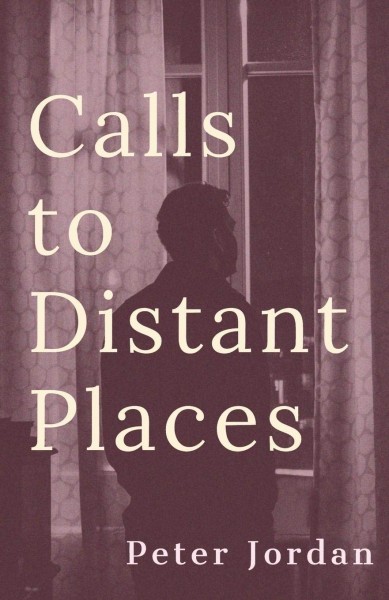
Reviewed by Sue Pearson
Peter Jordan’s debut short story collection, Calls to Distant Places (Kingston University Press 2019), takes its title from a line in the Big Book of Alcoholics Anonymous. And it is the episodic nature of the author’s own alcoholism that reflects the careful placing of the stories relating to addiction. But addiction is not the sole focus; it is acceptance which pervades this collection. Whilst acceptance is a fundamental ethos of AA, Jordan explores it more broadly. The result is humorous, thought provoking, challenging and poignant.
Each of the stories is told with a simple and direct narrative that contains astounding depths. The first story, “In Magazines”, employs two simple yet stunning opening lines. “I needed something I could sell. Something human.” Set in Afghanistan and seen through the camera eye of a war photographer, it tells the story of a young boy — shot in the stomach — who dreams of America. In just over one page, the writer manages to floor the reader. This is a feature of the whole collection.
A number of the stories are set in his native Ireland. In “Who Won the Donkey Derby?” he uses two unconnected drinkers, a taciturn barmaid, and a bar — which used to be the back room of her home — to define the drinking culture of small-town Donegal. I can smell the sourness of spilt beer, furniture polish, peat, and the aroma of stale cooking. In true Chekhovian style this information is not directly provided on the page. Instead, the reader is guided by a few well-chosen words that highlight essential aspects of setting, or objects that signify meaning. As our protagonist enters the room, he notices that it is dimly lit by two low-set windows, that there is a fireplace behind the other drinker and beyond the bar counter he can see into the kitchen. “It’s like the kitchen of any house in the town. There’s a combined food and water bowl for her cat on the linoleum floor.” I have taken the author’s guidance, inserted my own personal experience, and have become part of the story. Now, I look around me, taste and feel the atmosphere, and understand the nature and culture of his characters.
The titular story weeps humanity, transporting me back to Belfast where the author and I grew up. The story revolves around the distance between a young man and his older neighbour. The interaction between them on a chilly early morning centres on the death of a family pet, but has layers of warmth, love, loss, guilt and sorrow.
In “F is for Fish”, the central character’s alcoholic binge-drinking is described as a “flash flood” which has overwhelmed him to the point of physical paralysis. Asked to care for two goldfish while his AA sponsor is on holiday, he has known all along that this will not save him from drinking. What follows is a horrific insight into the hopeless state of an intelligent man. Able to observe all about him, and ruminate on his illness, he is physically incapable of controlling his body. Using the imagery of rain, flood, and desert landscape, he portrays the mental and physical torture of alcoholism to great effect. The story catalogues both an actual physical paralysis and a life held hostage to compulsion. Despite the bleak subject, the character is imbued with humanity and his observations are darkly humorous.
Jordan’s personal experiences enable him to create empathy for his characters allowing readers a richer understanding of them. “Luna” is a sublime example of this. The story opens as a female orca drags her trainer sixty feet down. Despite this, the trainer remains calm. Enough of the essential backstory is then introduced to create a gradual build-up of tension. You are brought so close to the action that you experience the trainer’s realisation and acceptance in a moment that is both enlightening and devastating.
The collection is well titled. On one level, I have been taken on a superbly crafted physical journey but on another, he has welcomed me to explore the depth of his imagination and, with candour, the most personal of his recalled experiences. He may call us to distant places but he asks us to nestle uncomfortably close at hand and pay attention.
To bring us closer still, “White Goods” is written in the second person. An unnamed man arrives to clean a sofa, you are then lost in the bewildering emptiness of the female character who has suffered a recent bereavement. With no understanding of her circumstances, the man hoovers the dust from the sofa. Unwittingly, he makes a macabre but beautifully poignant observation to conclude the story.
Jordan’s crafting, suggestion, and meticulously chosen language take you effortlessly from one story to the next. His scenarios are tangible and his characters so credible you share their experience. Essentially a short story is a picture in place and time, a glimpse realised. Well-mastered, it should stay in your thoughts long after reading. At the end of each story, I paused, the book in my hand, as the imagery played on.
__________________________
Sue Pearson writes poetry, and prose, leaning towards flash and short fiction. She is originally from Belfast and now lives in Newcastle Upon Tyne. In a previous life she was a family lawyer but rediscovered her love for writing and completed her MA in Creative Writing from Newcastle University in September 2019. Sue is embarking on her writing career and is to be published in the Bridges Anthology (Bandit Fiction) December 2019.

 Try SmokeLong Fitness for two months!
Try SmokeLong Fitness for two months!